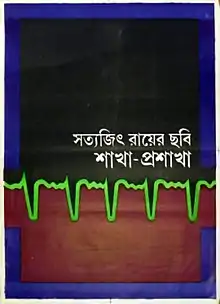Shakha Proshakha
Shakha Proshakha (English: Branches of the Tree) is a 1990 Satyajit Ray film. It deals with four generations of a well-to-do Bengali family, with a focus on the third generation. This film displays an extraordinary use of legendary orchestras of Bach and Beethoven.
| Shakha Proshakha | |
|---|---|
 | |
| Directed by | Satyajit Ray |
| Produced by | Satyajit Ray Productions, Gérard Depardieu (D. D. Productions), Daniel Toscan Du Plantier (Erato Films) and Soprofilms |
| Written by | Satyajit Ray |
| Starring | Ajit Bannerjee Haradhan Bannerjee Deepankar Dey Soumitra Chatterjee Ranjit Mallick Soham Chakraborty Lily Chakravarty Mamata Shankar |
| Music by | Satyajit Ray, Bach, Beethoven. |
| Cinematography | Barun Raha |
| Edited by | Dulal Dutta |
Release date |
|
Running time | 130 min. |
| Country | India |
| Language | Bengali |
Plot
Anandamohan Majumdar, a wealthy, retired industrialist, lives with his 93-year-old father Abhay Charan, and his second son Proshanto. Proshanto, who was once a promising mineralogist, was rendered mentally ill because of a motor accident in England after which he had to leave his job in a few months after he had returned to India, and now spends his time listening to music. However, his memories are still intact though they remain buried in him and only occasionally emerge in his mind, the reason being his mental instability. On the other hand, Abhay Charan used to be a successful English teacher in a school of Hazaribagh (from where Ananda passed out), but with age had slowly forgotten about past events and now lives the life of a senile man, being in the constant care of Ramdohin, one of the family servants.
On his 70th birthday, Ananda suddenly falls ill during a ceremony in his honor. His other three sons who live away rush immediately to his bedside.
The eldest son Probodh is a high-ranking officer in a company and the third son Probir is a businessman. They live corrupt lives and do not want their father, an uncompromising moralist who believes in work and honesty, to find out. It is also revealed that they are indifferent towards their grandfather Abhay Charan, due to their intolerance towards senility. The youngest of the four, Protap, weary of office life and corruption, has left his job and joins a professional theatre company to be away from corruption. During the family meals, tensions are accentuated. Dingo, Probir's only son, learns about the corrupt ways of his father and uncle. Waiting for resolution of their father's health crisis, the four brothers and their families reminisce and relive ideological differences.
One day, all of them except Proshanto go for a picnic. There Protap informs everyone that he left his job as he was not able to tolerate the corrupt practices of the officers. On the last day, Dingo goes to see his grandfather and unknowingly reveals to him about the dishonesty of his father and eldest uncle. This conversation is also heard by Proshanto. Then the families, unaware that their father now know about their corrupt ways, came to bid goodbye to Ananda. After their departure, Ananda feels heartbroken knowing that two of his children are dishonest. Proshanto comes to meet his father and his father reveals to him that he is now everything to him.
Other credits
Credits
| Producer | Satyajit Ray Productions, Gérard Depardieu (D. D. Productions), Daniel Toscan Du Plantier (Erato Films) and Soprofilms |
| Original Screenplay & Direction | Satyajit Ray |
| Cinematography | Barun Raha |
| Editing | Dulal Dutta |
| Art Direction | Ashoke Bose |
| Sound | Pierre Lenoir, Sujit Sarkar, Jyoti Chatterjee |
| Music | Satyajit Ray, Bach, Beethoven |
Cast
| Character | Relation | Performer | Notes |
|---|---|---|---|
| Anandamohan Majumdar | Father | Ajit Banerjee | NA |
| Probodh Majumdar | Eldest son | Haradhan Banerjee | NA |
| Proshanto Majumdar | Second son | Soumitra Chatterjee | NA |
| Probir Majumdar | Third son | Deepankar Dey | NA |
| Protap Majumdar | Fourth son | Ranjit Mallick | NA |
| Uma | Probodh's wife | Lily Chakravarty | NA |
| Tapti | Probir's wife | Mamata Shankar | NA |
| Dipak "Dingo" Majumdar | Grandson | Soham Chakraborty | NA |
| Abhay Charan Majumdar | Ananda's Father | Promod Ganguli | NA |
| Reporter | - | Pradip Mukherjee | NA |
References
External links
- satyajitray.org on the film
- "Satyajit Ray Film and Study Collection", UCSC
- Shakha Proshakha (Branches of the Tree) at IMDb
.jpg.webp)